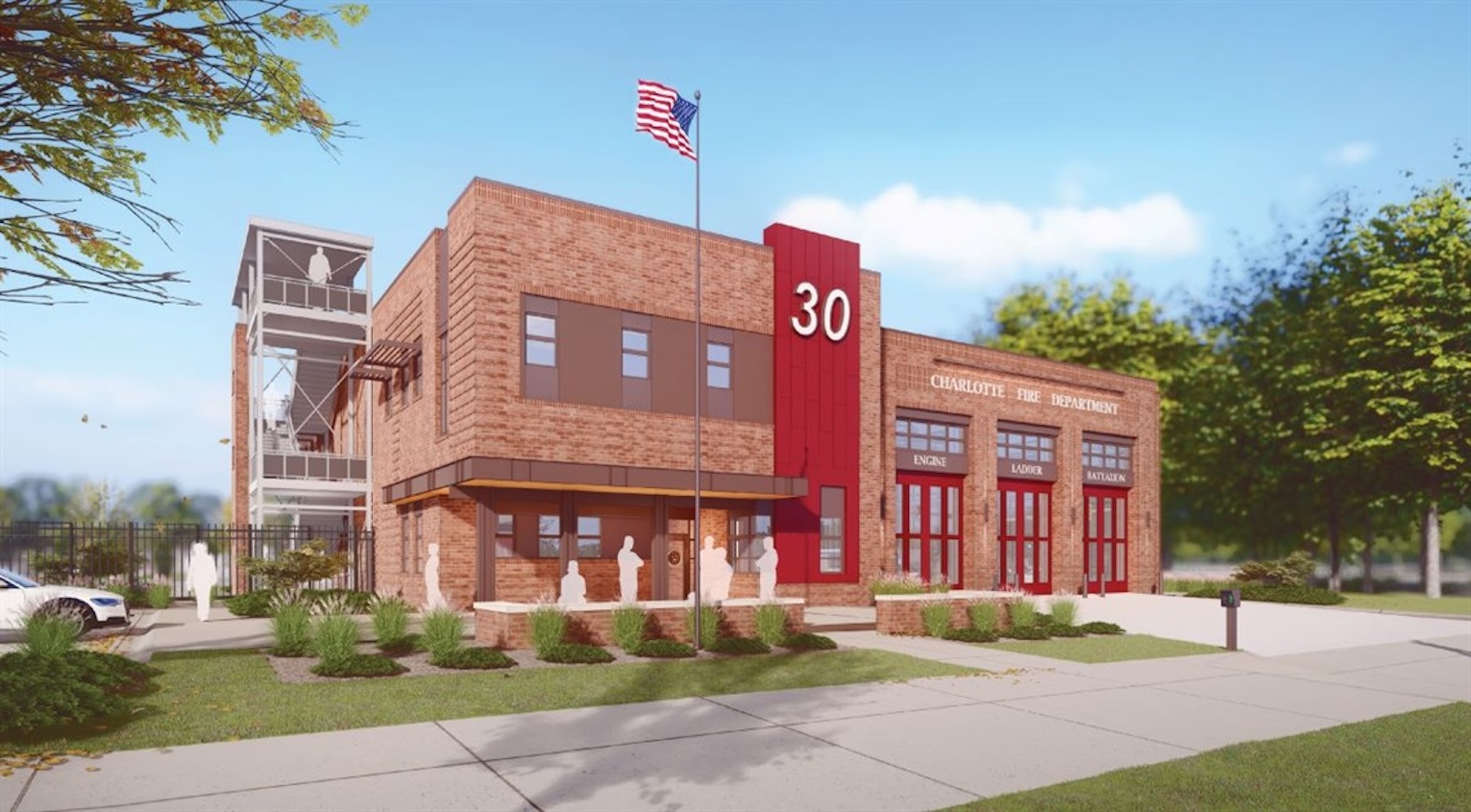Charlotte, N.C.’s new Fire Station #30 will be one of the country’s first all-electric fire stations, using no outside energy sources other than diesel fuel for one or two of the fire trucks. Multiple energy sources will power the station, including solar roof panels and geothermal wells. The two-story building features three truck bays, two fire poles, dispatch area, contamination room, and gear storage.
The $16.4 million, 14,000 sf station will be completed next fall. It will replace the original Station #30, a 1950’s-era residential home that was converted to a fire station in 1991. The new two-story building includes a fitness area with locker rooms, a kitchen and dining facility, a day room lounge, and offices for the captain and battalion chief. The second floor houses sleeping quarters and additional lockers and restrooms.
Geothermal wells will supply air conditioning as well as energy-efficient floor heating. Electric vehicle charging stations will charge the electric fire truck with additional wiring installed for future EV chargers. The site will also include two EV parking stations for employee cars.
RELATED STORY
Modular fire station allows for possible future reconfigurations
Core and shell construction includes the installation of new storefront systems of wall paneling and brick siding. A parking lot along with landscaping that includes tree planting is also part of the program. Throughout the project, general contractor Swinerton plans to use OpenSpace job site capturing, BIM 360 project collaboration, and drones to document construction.
Owner: City of Charlotte
Developer: Swinerton
Design architect/ Architect of record: ADW Architects
MEP engineering
Mechanical: Action Mechanical Contractors Inc.
Electrical: Stelco Electric LLC.
Plumbing: Peters Pipers Inc.
Structural engineer: Stewart Engineering
Here is the full press release from Swinerton:
Swinerton, an industry-leading commercial general contractor with offices nationwide, announces the construction of Charlotte Fire Department Station #30, one of the first all-electric fire stations in the United States. The $16.4 million build sets a new standard for public and civic spaces across North Carolina. Construction of the 14,000-square-foot project is underway and slated to be complete fall 2025.
“Sustainability tops the list of priorities at Swinerton,” explains Kevin Smith, Vice President, Division Manager, Swinerton’s Carolinas Division. “This new fire station, which will use no outside energy sources other than diesel fuel for one or two of the gas-powered fire trucks, is a testament to Charlotte’s commitment to its Strategic Energy Action Plan. We hope this is the first of many partnerships with the City of Charlotte to support its pursuit of this exceptionally important goal.” Initiated in June 2018, the city resolution strives to have its fleets and facilities be fueled by 100 percent zero-carbon sources by 2030.
Located at 3019 Beam Rd. on approximately three acres in southwest Charlotte, directly across from the city’s police and fire training academy, the all-electric fire station replaces the original Station #30, a 1950’s-era residential home that was converted to a fire station in 1991. Designed by ADW Architects, the new two-story building features three truck bays with accessibility from two fire poles, a dispatch area, decontamination room and gear storage. Additional amenities include a fitness area with locker rooms, a kitchen and dining facility, a day room lounge and offices for the captain and battalion chief. The second floor houses the sleeping quarters and additional lockers and restrooms.
Multiple energy sources will power Station #30. Solar roof panels are set to power the station while geothermic wells will supply air conditioning as well as energy-efficient floor heating. Electric vehicle charging stations will charge the electric fire truck with additional wiring installed for future EV chargers. The site will also include two EV parking stations for employee cars. The city plans to seek LEED® Silver certification as a showpiece for all future public buildings. “These sustainable measures promise a tangible reduction in operational carbon emissions compared to existing fire stations,” adds Smith.
As general contractor, Swinerton is providing ground-up construction services that include pre- and post-construction site work as well as core and shell construction that includes the installation of new storefront systems of wall paneling and brick siding. A parking lot along with landscaping that includes tree plantings, concludes the construction project. Throughout the project, Swinerton plans to use some of the many technologies in its arsenal, including OpenSpace job site capturing, BIM 360 project collaboration and drones to document construction.
Since expanding to the Southeast in 2018, the Carolinas Division has constructed nearly $400 million of commercial environments. The dedicated team of 90 construction leaders specializes in corporate interiors and buildings, healthcare, education, restaurants and hospitality, multifamily and mass timber construction.
Related Stories
Government Buildings | May 10, 2024
New federal buildings must be all-electric by 2030
A new Biden Administration rule bans the use of fossil fuels in new federal buildings beginning in 2030. The announcement came despite longstanding opposition to the rule by the natural gas industry.
Legislation | Mar 21, 2024
Bill would mandate solar panels on public buildings in New York City
A recently introduced bill in the New York City Council would mandate solar panel installations on the roofs of all city-owned buildings. The legislation would require 100 MW of solar photovoltaic systems be installed on public buildings by the end of 2025.
Products and Materials | Feb 29, 2024
Top building products for February 2024
BD+C Editors break down February's top 15 building products, from custom-engineered glass bridges to washroom accessories.
Modular Building | Feb 6, 2024
Modular fire station allows for possible future reconfigurations
A fire station in Southern California leveraged prefab, modular construction for faster completion and future reconfiguration.
Government Buildings | Jan 29, 2024
Army Corps of Engineers moves into new engineering and support center
The building, in Huntsville, Ala., combines office and warehouse spaces.
Sponsored | BD+C University Course | Jan 17, 2024
Waterproofing deep foundations for new construction
This continuing education course, by Walter P Moore's Amos Chan, P.E., BECxP, CxA+BE, covers design considerations for below-grade waterproofing for new construction, the types of below-grade systems available, and specific concerns associated with waterproofing deep foundations.
Museums | Jan 8, 2024
Achieving an ideal visitor experience with the ADROIT approach
Alan Reed, FAIA, LEED AP, shares his strategy for crafting logical, significant visitor experiences: The ADROIT approach.
Government Buildings | Dec 19, 2023
New Pennsylvania State Archives building holds documents dating back to 1680
Work was recently completed on a new Pennsylvania State Archives building in Harrisburg, Penn. The HGA-designed, 146,000-sf facility offers numerous amenities, including computers, scanners, printers, a kitchenette with seating, lockers, a meeting room, a classroom, an interactive video wall, gallery, and all-gender restrooms. The features are all intended to provide a welcoming and comfortable environment for visitors.
Giants 400 | Dec 12, 2023
Top 15 Veterans Affairs Facility Construction Firms for 2023
Walsh Group, Turner Construction, BL Harbert, and Hoar Construction top BD+C's ranking of the nation's largest Veterans Affairs facility general contractors and construction management (CM) firms for 2023, as reported in Building Design+Construction's 2023 Giants 400 Report.
Giants 400 | Dec 12, 2023
Top 20 Veterans Affairs Facility Engineering Firms for 2023
IMEG, Specialized Engineering Solutions, KPFF Consulting Engineers, and Heapy head BD+C's ranking of the nation's largest Veterans Affairs facility engineering and engineering/architecture (EA) firms for 2023, as reported in Building Design+Construction's 2023 Giants 400 Report.
















